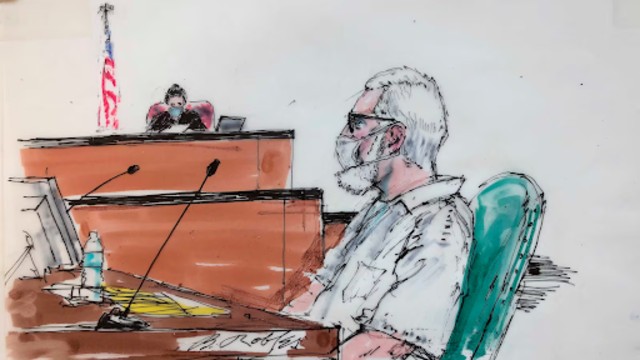
A courtroom sketch shows Tahawwur Rana at a U.S. federal court in Los Angeles on Thursday, June 24, 2021. The judge is deciding if Rana, a former businessman from Chicago, should be sent to India. He is accused of helping plan the 2008 Mumbai attacks, where 166 people, including six Americans, lost their lives. AP
India has received Tahawwur Hussain Rana, a suspect in the 2008 Mumbai attacks, after years of trying to bring him back. He reached India from the United States following his extradition. Authorities said he had no legal options left to stop it.
Rana, 64, was born in Pakistan. He later moved to Chicago and is also a citizen of Canada. India’s anti-terror agency said he helped the group behind the deadly attacks in Mumbai. The group, called Lashkar-e-Taiba, is blamed for killing 166 people over three days.
The extradition follows promises made during talks in Washington in 2020. At the time, the U.S. president told India’s prime minister that his government would send Rana back. He also called Rana “one of the very evil people in the world.”
The U.S. Supreme Court refused to accept Rana’s appeal against his extradition. After that, Indian officials completed the legal process with the help of U.S. authorities. Rana came back under an agreement between both countries.
Officials say Rana worked closely with David Coleman Headley, another man behind the Mumbai attacks. On November 26, 2008, ten armed men entered Mumbai by boat. They attacked crowded places including hotels, a Jewish center, and a train station.
In 2016, Headley gave details about the attack through video from the U.S. He admitted he used Rana’s immigration business in Chicago to visit India. He said that trip helped him pick targets for the attackers. Headley also claimed that Pakistan’s spy agency, ISI, helped plan the attack.
India blames the ISI for helping Lashkar-e-Taiba, but Pakistan has denied any role in the attack or links between its agency and the group.
A court in India had pardoned Headley under the condition that he would testify as a witness. He is currently serving time in a U.S. prison for his part in the crime.
Rana’s involvement goes back to more than just the Mumbai case. He was found not guilty of being part of the attack plot by a U.S. court in 2013. But he was convicted in a separate case. That case was related to a plan to attack a Danish newspaper that had published cartoons of Prophet Mohammad. The U.S. court sentenced him for that crime and sent him to federal prison.
One of the ten attackers, Ajmal Amir Kasab, was captured alive in 2008. Authorities hanged him in India four years later after a trial.
Rana now faces legal proceedings in India. Authorities believe he played a key role in helping the attackers from abroad. They say this is a big step forward in finding justice for the victims of the Mumbai tragedy.















